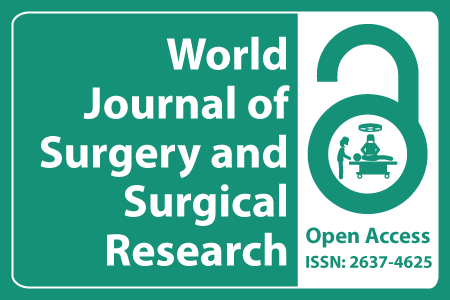
Journal Basic Info
- Impact Factor: 1.989**
- H-Index: 6
- ISSN: 2637-4625
- DOI: 10.25107/2637-4625
Major Scope
- Hepatology
- Pediatric Surgery
- Urological Surgery
- Minimal Invasive Surgery
- Otolaryngology & ENT Surgery
- Transplant Surgery
- Orthopaedic Surgery
- General Surgery
Abstract
Citation: World J Surg Surg Res. 2018;1(1):1023.DOI: 10.25107/2637-4625.1023
Bilobar Liver Metastases: A Challenge for Surgical Strategies
Fabio Uggeri, Mattia Garancini, Simone Famularo, Enrico Pinotti, Luca Gianotti and Fabrizio Romano
Department of Surgery, San Gerardo Hospital, Italy
Department of Surgery, University of Milano Bicocca, Italy
*Correspondance to: Fabrizio Romano
PDF Full Text Review Article | Open Access
Abstract:
In recent decades, the surgical approach in patients with liver metastasis has seen substantial changes. The encouraging results in terms of survival after surgical resection led to more interventionist attitude, widening indications and bringing more and more patients to curative treatments. Moreover, the technological advancement of surgical devices and the improvement of imaging techniques have made liver surgery safer and more feasible. But, in the most complex cases the attempt to perform surgical curative resections often collided with the inability to preserve an appropriate post-operative volume, necessary to avoid postoperative hepatic failure. In fact the management of liver cirrhosis or small size hepatic remnant still remains a challenge. Currently post-hepatectomy liver failure is the major cause of death after liver resection often associated with sepsis and ischemia-reperfusion injury. In recent years, surgeons have been working to develop new strategies to overcome this limit. Several methods have been proposed for preventing postoperative hepatic failure both in the preoperative, perioperative and postoperative management. Since the introduction of the preoperative portal embolization proposed by Makucchi in the 80’s giant steps have been made. To date in order to limit the damage to parenchyma and to optimize regenerative hepatic capacity many technical considerations have been taken into account. The purpose of this chapter is to describe the new surgical attitudes regarding the treatment of bilobar liver metastases, focusing on surgical techniques that at present seem to be more effective, underlying the benefit and limits of each procedure. In addition to the technical description, a comparison of the various procedures was carried out to demonstrate the feasibility and to check for the critical issue of each one.
Keywords:
Liver metastases; Hepatectomy; ALPPS
Cite the Article:
Uggeri F, Garancini M, Famularo S, Pinotti E, Gianotti L, Romano F. Bilobar Liver Metastases: A Challenge for Surgical Strategies. World J Surg Surgical Res. 2018; 1: 1023.













